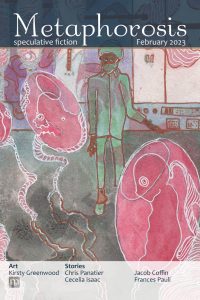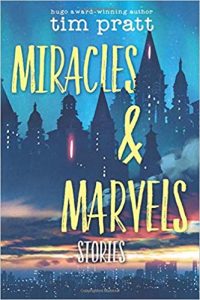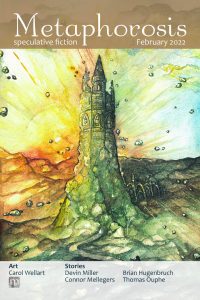Karen Burnham Reviews Short Fiction: Metaphorosis and Solarpunk
 Metaphorosis 2/23
Metaphorosis 2/23
Solarpunk 1-2/23
I don’t get around to reading Metaphorosis as often as I’d like, and they’ve got a solid issue in February. I like how the stories center on working stiffs in very different circumstances. In “The Excursionist of JCPenney” by Chris Panatier, Lorraine has worked at her local JCPenney for decades. Suffering from some brain damage and a bad eye due to early childhood abuse, she sticks to a very constrained routine and pours her heart and soul into being good at her job. Unfortunately, their store is targeted for closure, and the frantic rush of a closeout sale begins. Her manager tells her to take just about anything that catches her eye; it’s not like they owe the company any loyalty at this point. Lorraine discovers that putting on clothes that customers have tried on and discarded, and then looking through her “bad” eye only, she is literally transported to beautiful and exotic locales that those customers have visited as tourists and such. This opens up the world to a woman who can’t even drive. Then “The Frozen Generation” by Jacob Coffin looks at a world where the US officially defines life as beginning at conception no matter what. Moses works at a facility that stores something like 600,000 embryos in cryogenic containers. The facility is under attack by fanatics (the political rationales get a little confusing) and Moses and his crew fight to save as many “patients” as possible even as the power gets cut. It’s painful to read but a good portrait of someone determined to do their job to the very end. Speaking of endings, “The Numismatist” by Cecelia Isaac stars Charon himself, boatman of the river Styx. He accepts an obol from one particular soul, Achem – but it turns out to be stale bread instead of a coin. He tosses the soul back on the shore to wait 100 years if they can’t produce a real coin. Achem is quite a character and tries any number of tricks to win their way to the other side. This includes tempting another soul to break into Charon’s house and steal a case full of obols that Charon has carefully polished and stored – he has kept each and every one from every soul he ferries. The story is from Charon’s point of view, and the way he and Achem become frenemies of a sort is really charming.
Solarpunk magazine seems to be going strong, with issue #7 coming out for the Winter. The three original stories here demonstrate just how broad the mien can be within the nascent “hopepunk” movement. “Bushbaby” by Han Whiteoak starts out largely despairing. The narrator and her husband have a baby girl, but like many children born around the same time and area, she has strange characteristics. Their suburb is being overtaken by aggressive vegetation planted to combat climate change, and the baby seems much more comfortable in an almost arboreal environment than any previous generation of human babies. The father is absolutely resistant to this new evolution, but the mother come to realize that the children have special potential to navigate this strange new world. “Midnight Serenade” by J. Dianne Dotson is a YA tale with Mira, age 14, as the protagonist. Being 14 means she’ll never be able to attend the Glowworm ball, which is only for 15-year-olds, because her family is moving away soon. She is distraught, especially watching one of her friends get ready for the special day, but things might turn around for her as she makes a delivery to an old friend of her mother’s. The worldbuilding involves nanotech and biotech and not being able to go out in direct sunlight, but that’s well backgrounded compared to Mira’s youthful drama. Then in “Our Cousin’s Keepers” by Marshall J. Moore, a joint human/dolphin mission has made it into orbit around the planet Tethys. They start a settlement of floating bases that allow easy access for both species. Lash is a young dolphin assigned to explore the local environment. (The one thing I couldn’t quite wrap my head around is that Lash was sent out solo, when it seems like anything and everything would argue for the dolphins to stay in groups.) On his expedition, he hears an intense voice through the water that he realizes represents an oceanic world mind. It is leaning towards killing off their entire settlement, since it had previously been colonized by beings intent on damaging extractive activities. It’s up to Lash to argue for the future of the whole expedition, knowing that Earth is more or less a smoking ruin behind them. It’s an interesting exercise to have a species that we have directly harmed, even as we’ve tried to reach across the communication barrier, be the ones to make the argument that we’re not a completely lost cause.
Recommended Stories
“Midnight Serenade”, J. Dianne Dotson (Solarpunk 1-2/23)
“The Numismatist”, Cecelia Isaac (Metaphorosis 2/23)
Karen Burnham is an electromagnetics engineer by way of vocation, and a book reviewer/critic by way of avocation. She has worked on NASA projects including the Dream Chaser spacecraft and currently works in the automotive industry in Michigan. She has reviewed for venues such as Locus Magazine, NYRSF, Strange Horizons, SFSignal.com, and Cascadia Subduction Zone. She has produced podcasts for Locusmag.com and SFSignal.com, especially SF Crossing the Gulf with Karen Lord. Her book on Greg Egan came out from University of Illinois Press in 2014, and she has twice been nominated in the Best Non-Fiction category of the British SF Awards.
This review and more like it in the March 2023 issue of Locus.
 While you are here, please take a moment to support Locus with a one-time or recurring donation. We rely on reader donations to keep the magazine and site going, and would like to keep the site paywall free, but WE NEED YOUR FINANCIAL SUPPORT to continue quality coverage of the science fiction and fantasy field.
While you are here, please take a moment to support Locus with a one-time or recurring donation. We rely on reader donations to keep the magazine and site going, and would like to keep the site paywall free, but WE NEED YOUR FINANCIAL SUPPORT to continue quality coverage of the science fiction and fantasy field.
©Locus Magazine. Copyrighted material may not be republished without permission of LSFF.





